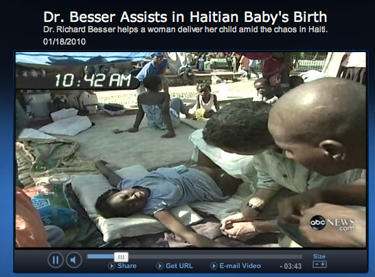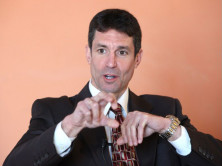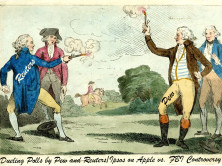
Dr. Besser of ABC assists a woman in labor. (Screen capture from ABC News video)
Comments on the role or reporters during disaster situations have spread beyond the story of CNN correspondent Dr. Sanjay Gupta following last week’s devastating Haiti earthquake.
Multiple networks have dispatched correspondents to Haiti who are licensed or practicing doctors, raising questions about how reporters who are also medical professionals must ethically weigh their two roles, and also how networks should make decisions about utilizing these reporters.
We wrote last week about Dr. Gupta’s experience in Haiti and whether treating patients while on the air for CNN sensationalizes or adversely affects the network’s coverage of the disaster. Now more voices have weighed in, revealing that these questions go beyond CNN and Gupta to NBC, ABC, CBS, and others.
Matea Gold writes in the Los Angeles Times, “This isn’t the first time medical correspondents have played doctor in the field… But news executives said the number of network correspondents assisting the wounded in Haiti was unprecedented.”
“For the first time, all of the major domestic TV news networks have deployed doctor-reporters to the scene of a natural disaster, producing a dramatic kind of participatory journalism,” Paul Farhi writes in the Washington Post.
There seem to be two issues raised by the situation in Haiti. The first addresses how reporters should balance their responsibilities as doctors and their responsibilities as journalists. Have physician-journalists been striking the right balance? The other regards the influence of the networks themselves. Have they taken ethical steps in deploying these reporters to Haiti, and deciding how (and how often) to broadcast the resulting images and experiences?
Farhi argues that Gupta himself may be the reason for the other networks bringing on doctor-reporters who find themselves engaging in this kind of participatory reporting. “The twin roles — doctor and journalist — might be a reflection of the Gupta Effect,” he writes.”
Gold writes in the LA Times,
On Sunday, ABC’s Dr. Richard Besser assisted a pregnant woman in labor and NBC’s Dr. Nancy Snyderman operated on the wounded in a makeshift clinic. CNN’s Dr. Sanjay Gupta performed surgery Monday on a girl with a skull fracture who had been airlifted to the aircraft carrier Carl Vinson.
It seems clear for all of these reporters that it would be unethical to refuse to act as a doctor while faced with humans in need of medical care. At the same time, reporters could choose to perform these medical services off camera, reporting on them later or covering other events the did not themselves participate in.
Gupta told the Los Angeles Times, “I don’t think our intention is to ever make the story about myself… I think people innately understand that there is a tremendous medical need down here, and if you can help, you should help.” However, the visual impact of his broadcasts from Haiti sometimes painted a different picture. One video widely broadcast by CNN showed Gupta treating a baby with a small head wound. The injury turned out to be minor, just a cut. Ethics expert Bob Steele told the Los Angeles Times that this is an example of where a doctor’s actions shouldn’t have overlapped with a reporter’s. “Frankly, it isn’t much of a story… You can’t help but look at this and worry there is a marketing element in it.”
Stephen J.A. Ward, director of the Center for Journalism Ethics at the University of Wisconsin’s journalism school tells the Washington Post “I understand that [offering medical assistance] makes for dramatic scenes, and it does bring a human face to the whole story, but this has to be treated very carefully.” Like Steele, he says these kind of images can become self-promotional.
Gary Schwitzer, a medical journalism expert and editor of HealthNewsReview writes, “Clearly, the moral value of helping a person in need is a dominant value… Rather than doing nothing to help, or – at the other extreme – rather than reporting on one’s own involvement in helping, a middle ground might be to help – but with the cameras off.”
At the same time, choosing not to broadcast the doctors’ actions may also be ethically fraught. After all, the purpose of the news is to inform people of the breadth of experience and action. Some medical acts may merit coverage, and to avoid them because a reporter is involved in the action may reduce the scope of coverage.
Farhi writes in the Washington Post that “Network executives and correspondents counter that such firsthand accounts offer close-up perspectives of the medical challenges facing Haiti’s people, and that they bring the crisis home to viewers in a way that straightforward reporting does not.”
Clearly a balance needs to be established, where reporters weigh carefully which of their medical acts merit news coverage and which do not. Networks at the same time should weigh carefully the benefit these firsthand experiences offer the viewer, against the risk of showboating and sensationalizing. One doctor-reporter who seems to hold a balanced view on his role, Richard Besser of ABC tells Farhi, “I think you’ll only see me [giving care] on camera when it illustrates a bigger story. I don’t want the story to be about me. It’s about the situation here.”
In an interview with Baltimore Sun writer David Zurawik, Gupta revealed that most of his actions as a doctor in Haiti have not been broadcast. “We’re not [filming] any of it except for the one clip you are referring to,” he said.






